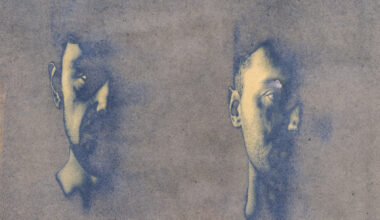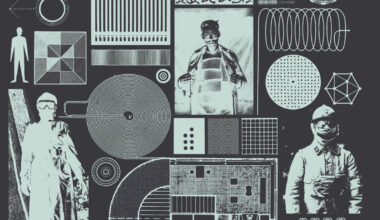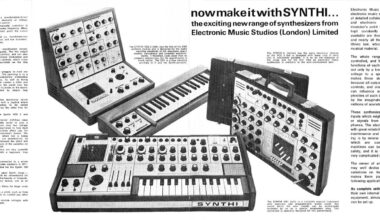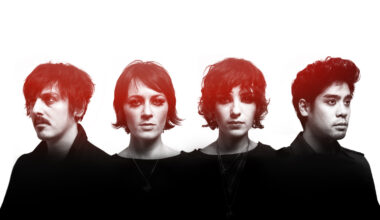Catching him backstage before one of his recent London shows, we enjoy a free-ranging and sometimes painfully honest conversation with Gary Numan, taking in his past, his present and his future. We discuss recordings old and new, his darkest lows and his wildest highs, love and marriage and the kids, his hopes and fears for the years to come, and a whole lot more besides…
“Owwwww!”
Gary Numan screws up his face in pain and frantically rubs the side of his head. His wife Gemma pulls his hand away and peers closely at his ear lobe. The ear lobe which, without warning and seemingly without reason, she has just sunk her teeth into. She’s makes a “pffft” sound and starts giggling.
“Fucking hell Gemma, what did you do that for?” yells Numan. “I’m going to need that ear later on. I’ve got a gig to do.”
“I’m fed up with you and your penis and your… your… your other things,” she says.
“What other things?” asks Numan.
“Your ball bag and your… your moods,” replies Gemma, still giggling as she rummages around in her make-up bag. “Anyway, never mind all that. Come and sit here so I can do your eyes.”
“I don’t have moods,” he says with a huff and a grump, taking a seat in front of the huge mirror and giving his ear another quick rub.
We’re backstage at The Forum in London’s Kentish Town on the third and final leg of a unique series of Gary Numan shows. Two nights ago, he played the ‘Relics’ albums in its entirety. Last night, he played ‘The Pleasure Principle’, again in its entirety. And in around three hours he’ll take the stage again, this time to perform ‘Telekon’. The three albums are the brightest jewels in Numan’s early back catalogue, released in a hectic and intense period of just 18 months between April 1979 and September 1980. All three records were Number One in the UK, as were the ‘Are “Friends” Electric?’ and ‘Cars’ singles. Hectic and intense and then some.
The dressing room at The Forum is at the top of the building and is reasonably spacious. There are bowls of fruit and bowls of sweets and boxes of records dotted around. Numan finished soundchecking around half an hour ago and has spent the time since sitting on a black leather couch, busily signing ‘Telekon’ album covers to sell on tonight’s merchandising stall. He’s been using a silver felt-tip pen and he’s managed to get ink on the couch several times. He tuts at himself whenever he does it. He’s not actually the least bit moody or huffy or grumpy, though. Quite the opposite, in fact.
“The last two nights have been fantastic, probably two of the best gigs I’ve ever played,” he says, as Gemma gets to work on his eyes. “In terms of the crowd reaction, they’ve been phenomenal. We did these same three shows in LA a few weeks ago and that was brilliant too. ‘The Pleasure Principle’ was a big album in America but the other two weren’t, so I was amazed at how well people knew the stuff. I was surprised anyone even came, to be honest. But doing the shows here in London, in my home city, that’s a bit special. There’s always that extra vibe when you go back to where you’re from.”
“There you go, Biffo,” says Gemma, using her pet name for Numan and inspecting her handiwork in the mirror. “I think that’ll do. Yeah, you don’t look too bad at all.”
“You don’t have to sound so surprised,” he mumbles.
A little later on, Numan and I find a quiet corner for a chat. I start by asking him a question that he hesitates over for a few moments before answering.
What’s the best thing about being Gary Numan?
“Hmmm. This isn’t just specific to me, but you have an enormous amount of freedom when you do something like making music for a living,” he says. “If I get up one morning and I don’t feel like working, I don’t have to. I could stay in bed, I could go down the beach, I can do what I want. It’s not like that every single day because there’s always lots to do and sometimes there are deadlines and it’s obviously different when I’m touring, but in general I get to choose when I want to work. I think very few other people have that sort of luxury in their jobs and I appreciate that hugely.
“As far as being Gary Numan is concerned… I think the best bit about being me… Fuck, this is difficult… Well, these days, I have a fairly ridiculous amount of credibility and I do enjoy that. That’s very cool. Then there’s the fact that, while I’m getting older, I’m still young enough to be able to make albums and go on tour and still be an active part of the music industry. I’ve got the benefit of a tremendous amount of experience and a extensive back catalogue which commands a lot of respect, especially the earlier stuff, and yet my last album got the best reviews I’ve ever had, which is a great but a bit strange. So all in all, there’s a whole world of reasons that make it pretty good being me at the moment.”
We’re going to touch on some of this stuff again in a while. But first, I want to ask about these three London shows. Performing three albums over three nights must have been a daunting prospect.
“There’s been a lot of stuff to learn,” admits Numan. “I think it’s 42 songs in total. When you’re learning a normal live set, you’ll have 20 or 25 songs and you’ll go over them day after day after day, so they get ingrained in your brain. Because this is three different sets, we’d rehearse one of them for a couple of days, then switch to the next one, then to the third one, and by the time we went back to the first set we’d forgotten a lot of it because we hadn’t been doing it over and over again. We’d go back to songs we’d played quite well last time and found they were shit again. You’d think something had stuck, but it hadn’t stuck at all. Especially the lyrics. I had real trouble remembering the lyrics half the time.”
How do you rate those albums now?
“They’re, what, 35 or 36 years old, which is a long, long time ago, but I don’t think they sound particularly dated. When I started the project, I was worried I’d find some of it slightly embarrassing and, true enough, lyrically there’s a little too much teenage angst, you know, ‘Oh, poor little me, nobody understands me’, that kind of stuff, but overall I think they’re pretty good.”
Do you have a favourite of the three?
“I used to always say ‘Telekon’. I used to think that was the best one by far. But I’m not so sure now. ‘Telekon’ is a bit of a weird one, really. Some of the songs are great to do live – ‘I’m An Agent’, ‘Remind Me To Smile’ and all that stuff – but I think it works best listening to it at home with your headphones on. Of the other two, the one I’ve had most fun playing is ‘Replicas’, probably because it’s a bit more guitary. With ‘The Pleasure Principle’, I’m at the keyboard quite a lot, which means I have to concentrate more on what I’m playing. And you can throw much better shapes with a guitar, of course.”
The decision to play the albums in their entirety means there are no get-outs. Are there any songs that you think, ‘Christ, I wish I didn’t have to play this one’?
“One or two, yeah,” says Numan with a hearty laugh. “Funnily enough, having just said how much I loved playing ’Replicas’, I don’t really like the couple of instrumentals that are on there. The fans seem to like them for some reason, but I find them quite awkward.”
When ‘Relics’, ‘The Pleasure Principle’ and ‘Telekon’ were first released, everything about Gary Numan – his music, his lyrics, his shifting image, his whole vibe – was decidedly not rock ’n’ roll. The same was true of his live shows back then. These days, however, he’s rather fond of holding the microphone stand at 45 degrees and sticking his foot up on the monitor. Having watched the soundcheck earlier on in the evening, I know that despite the old material he’s playing for these shows, his delivery is very much Numan 2015 rather than Numan 1980. I suggest to him that there’s a bit of a contradiction there.
“I started out trying to keep the songs pretty much as they were, maybe with enhancements here and there, but we ended up having far more powerful versions,” he says. “Most of those albums were recorded in mono, so they don’t have the width or depth you’d get now, which meant we had to work on them to make them bigger and better while at the same time not changing them beyond recognition. You have to be careful because the fans don’t want to hear anything too radically different. They’ll get fucked off because they’ve come to hear the album. So you’ve got to bridge that gap somehow.
“In the end, I decided not to worry about it too much. Not to overly plan it. I just thought, ‘I’m gonna walk out and do whatever feels right for that song at that time’. And that’s what I’ve been doing. The idea of this was never to recreate what happened in 1979 or 1980. When I announced these gigs, I had a few people say to me, ‘Oh, are you gonna wear the leather jumpsuits?’. I said, ‘No. No I’m fucking not’. This has been about celebrating the music I wrote back in those days, but the way I looked and the way I moved, that’s done, that’s gone. I’m about a stone and a half heavier than I was then, so I wouldn’t fit into one of those jumpsuits anyway.”

Typical of every dressing room, there are lots of comings and goings. Tour manager Dave Dupuis wanders in and out every few minutes with an open laptop permanently balanced on the palm of his left hand. It seems to be superglued there. Numan’s long-time guitarist Steve Harris tucks into his takeaway and there’s a message from someone at the stage door who says he knew Numan 30 years ago. Gemma chats to somebody about tonight’s “Meet and Greet”, which is an opportunity for small groups of fans to meet Numan. She calls it the “Meet and Grope”, but Numan takes it very seriously, giving everybody plenty of time to chat and collect autographs.
Over in our quiet corner of the room, I start asking some rather more personal questions. I tell Numan that I think his relationship with Gemma appears to be very playful. Is that a fair description?
“It is, yeah, very much so,” he says, grinning broadly. “Yeah, playful is a good word for it.”
She plays an important part in your career, doesn’t she?
“Everything I do. Absolutely everything. She has done since the day she arrived. We’ve been together for 23 years and we have an amazing relationship. There’s lots of banter and making fun of each other. She’s got a huge personality and she’s incredibly likeable and loveable. She’s so much fun to be around. People gravitate towards her all the time. She’s really friendly and really kind and absolutely the best person ever for me. She’s changed my life around completely from how it was when we met. It’s all down to her. She’s a brilliant mum, a brilliant wife, a brilliant human being.
“People talk about having a soul mate and stuff like that, but that’s Gemma for me. It really is. I’ve always felt I was somehow broken as a person in the sense that there are a few things I can do really well, but there’s a whole world of stuff I’m really bad at and have no skills in whatsoever. All the things that I can’t do, which is probably 90 per cent of what I need, is where Gemma comes in. So as a team, we work very well together. We complement each other perfectly. That’s why it’s rare to ever see one of us anywhere without the other.”
Numan has three daughters – Raven, Persia and Echo (aged from 12 to eight) – and I wonder what sort of impact becoming a family man had on him. That’s a whole other life there, isn’t it?
“To be honest, it’s taken me a long time to find a way of making it all work in a fairly painless kind of way,” he says. “Before I had children, I would drive for hours and hours, no music on, just driving and thinking. Thinking about the next track I wanted to do, the last one I did, the next studio I was going to use, what equipment was there… just thinking all the time. You don’t realise what an important part of the process that is until you can’t do it any more. Now when I go out in the car, it’s chaos. Three kids shouting and arguing and fighting all the time. Total fucking chaos.
“These days, I dovetail my day around the children. I get up early, I do their breakfasts, me and Gemma drive them to school, I come back and do some emails and other bits, and then I try to get into the studio by 10 if I can, certainly no later than 11. I’ll stay in the studio until about four, which is when the children come home, and then we’ll all spend time together as a family. When the children go to bed, if I was having a good day in the studio, I’ll then go back out and carry on for a while. At weekends, I try to be free for them if I can, so we can go out and about and do normal things – cinema, restaurants, the beach. It’s a good balance. Their lives are as normal as possible and I still get to work and be creative and come up with new ideas.
“But like I said, it took ages to get to this point. I really struggled with it. The first five or six years, maybe more, I was useless. That’s why the last album took so long. ‘Splinter’ was a nightmare in that respect. I couldn’t get it together at all. I’d go to the studio and do some stuff and it would be rubbish, and then I wouldn’t go back out there for a month because of kids and other stuff going on. Then I had depression for three or four years and that fucked me up again. Part of that was trying to work out this new life I had and how to make it work. I couldn’t see a way through it. But I’ve got to where I am now and it’s working very well. So fingers crossed I’m alright again.”
You’ve done a lot of heavy touring since ‘Splinter’ came out in 2013. Do the girls usually stay at home when you’re away?
“At the moment. I do love touring but I badly miss the children. We’re trying to find a way around that, though. I’m trying to find a way of mostly touring during the school holidays so I can bring them with me. I think they’d love it. They often come to shows anyway and they get really excited by it. They’re all obsessed with music and I’d love them to be in the business when they grow up. They can all sing really well, they’re all learning instruments at school, so I think it would be great. I’m not one of those dads who says, ‘Oh, I don’t want my kids to follow in my footsteps’. I’m the total opposite. I’d love it if they wanted to follow me.”
It sounds like you’ve got the makings of a great all-girl band there.
“Maybe,” he chuckles. “I do know that Raven has properly got it. No question. We’re working on an album with her now and she’s only 12. She’s written 14 or 15 songs and they’re all cool little pop songs, really catchy, really strong. She’s writing songs at 12 far better than what I was writing at 21. Honestly. She’s great pop sensibility and she’s really bossy, she knows what she wants. And she’s got a good ear, she can listen to something and then sit down and work it out straight away. She’s a clever girl. Persia is starting to do that as well now and there are signs of it in Echo too.”
You seem to have become a more comfortable with yourself over the last few years. Would you say that was true?
“I think so, but some of that has come from getting older. I’ve just got more used to myself!”
Do you worry about getting older, about ageing?
“I don’t worry about the lines on my face or my energy levels, but I do worry about death. I’m 57 now and it started when I turned 50. That was another reason for my depression, actually. I first noticed it when I started getting weird about old people. If I saw an old person, I’d sometimes get really upset, I’d start crying. I found it terrifying, you know, thinking about how you dealt with the prospect of the end the closer you get to it. I couldn’t even think about my mum and dad, I’d get so upset thinking about them, and I began to have panic attacks. After many months of that, I eventually ended up at the doctors and they diagnosed me as having depression.
“I’m not so bad now, but I still struggle with it, with the idea of not being here or of something nasty happening, like cancer or Alzheimer’s. I’m a bit of a hypochondriac, you know, I’ve only got to get a headache and I’m thinking, ‘Oh God, I’ve got a brain tumour’. I’m really bad for stuff like that. In a way, I’m fucking ashamed of myself. It’s fucking pathetic really. But how can you not worry about dying? I’m not religious, I don’t think I’m going somewhere golden, there are no pearly gates waiting for me. And even if there was, I wouldn’t be going through them. I’m just going to be dead and that’s it. I guess I think, well, these things are lurking and the older I get, the more they lurk. So, yeah, I do worry about it. I worry about it a lot.”
We chat a little about the future, about Numan’s plans to release a new album towards the end of next year and about a track he’s recorded with Jean-Michel Jarre for the second volume of Jarre’s ‘Electronica’ collaborations. He describes Jarre as “the nicest person I’ve ever met”. I want to talk a bit more about his three London shows, though, so I ask him why he decided to do these shows at this point in time.
“I’m not actually a fan of nostalgia and retro stuff… far from it,” says Numan. “I’m just not that interested in looking backwards, that’s the biggest reason, but I’ve also had a chip on my shoulder about my previous success and the shadow it casts over everything I’ve tried to do since. In the 1990s and the early 2000s, if I saw a photo of myself in a magazine it would always say, ’80s icon Gary Numan’, and I’d think, ‘For fuck’s sake, why did they have to say that?’. I got really bothered about it. Really bothered. Far more than I needed to be. So I built up this resentment for my past, which was childish to be honest, but that was how I felt. It was like my past was holding me back and diverting people’s attention from the new stuff I was doing.
“But then ‘Splinter’ came along and it had all these amazing reviews and it did really well. Lots of reviews said it was one of the best things I’d ever done. So since then, it’s like I’ve come out of the shadows and I’m recognised as a viable, ongoing, credible act from today, not just an 80s person hanging on to past glories, and that made me feel very differently. I spent two years touring ‘Splinter’ and I’ll no doubt spent two years touring the next album, but I wanted to do something in between so I thought, ‘OK, let’s do this’. I knew the fans would love it and it feels like it’s not going to hurt me any more. So it’s been kind of a nice diversion and, yeah, I must admit it’s been fun.”
You’ve obviously spent a lot of time back under the hood of ‘Replicas’, ‘The Pleasure Principle’ and ‘Telekon’ over the last two or three months. Looking back to that time, what do you think of the 21-year old Gary Numan?
“I was a very immature, very naive young guy. I was still living at home, I had no experience of the world, and I was a really awkward personality. I’ve got Asperger’s syndrome, as a lot of people know, and it was really bad back then. Much worse than it is now. So I had the usual things you have at that age, the angst and the fears and the feeling you’re not understood by anyone, but then the Asperger’s made it much worse. And when you take that sort of person, with those problems, and suddenly make them an overnight star… I know I did some silly things and said some silly things at the time, but I was kind of bouncing off the walls. The press were quite hostile too, which didn’t help. So it was a pretty difficult time. I was having a hard time just getting through life really, let alone being a rock star on top of it.
“I think what got me through it is I’ve always been incredibly grounded. I’ve never been a big star-tripper, I’ve never had a big ego, despite how it might have appeared sometimes. I’ve always felt lucky rather than clever. Always. I’ve had a massive problem with confidence from the day I started, right up to today. It doesn’t matter how many people cover my songs or sample them or say I’m influential, all of which is lovely and I’m very grateful, it’s never made me feel any more confident. I’ll write a song in the morning and I’ll love it, but by the afternoon I’ll think it’s a piece of shit. But doubting myself is also a driving force. It makes me work harder and want to do better. And I was like that then as well, so when I look back at me growing up and I just see somebody really troubled, doing the best they could to deal with an unbelievable situation, and probably not doing too bad a job.”
What do you think the 21-year-old Numan would make of you now?
“I think he’d be well pleased. I’m happily married and I’ve got three beautiful children who make me really proud of them all the time, so that side of my life is sorted. I think he’d also be pleased that I’ve had a long career but I haven’t ended up blanding out or doing nothing but endless nostalgia shows. And I really had to fight to still be here today. There were lots of years when my career was going so badly. I really was fucked. I was selling no albums and I couldn’t give away tickets to my gigs. I literally couldn’t. We had people going down the street, giving away tickets just to try to bring numbers into gigs, and people didn’t want them. The five years between 1988 and 1993, I was absolutely dead and buried. It was a nightmare.”
Did you ever think about giving up during that period?
“I thought I was going to have to. By 1993, I thought I was finished. Creatively, I was empty. I had nothing to say. I had no record deal and I had massive money problems. I’d sold pretty much everything. All I had left was a 12-channel portastudio, an Akai 1214, a couple of old synths and a guitar. I had them in a room next to the kitchen in my house and the room wasn’t soundproofed so I used to have to work on headphones. That’s how fucking bad it got.
“Anyway, somehow I put together an album in that room and I released it myself. It was ‘Sacrifice’, the first of the much heavier albums I did, so it was completely different to what I’d done before, and it was also the first one I’d done for years where I hadn’t thought about A&R men or radio play or any of that shit. But by doing something different and abandoning my worries about my career, I fell in love with the whole thing all over again. From a creative point of view, I felt like I’d got back on my feet again. And then luckily, that album did better and it’s been an uphill path ever since then. By going back to doing it for the love of it, that changed everything.”
Numan has certainly had a roller-coaster career. Since the success of ‘Splinter’, he’s been riding a real crest. But how does today’s high compare to the high of 1979 and 1980, when ‘Relics’, ‘The Pleasure Principle’ and ‘Telekon’ sat at the top of the album charts?
“It was pretty extreme back then. At its peak, ‘Are “Friends” Electric?’ was doing 40,000 copies a day. A day! I mean, fucking hell, 40,000 a day! Staggering. The fans were very young so it was proper mania, proper hysteria, people would chase me down the street and I had police escorts when I came out of gigs. It was very exciting, but that’s obviously not the way it is any more… thank goodness! It was great and I loved it at the time, but I don’t think I could handle it now. At the moment, I love what I’m doing and the position I’m in and I’m very happy about that. Considering how successful I was and how it had all gone about 10 years later, to go from that to where I am now, that’s very satisfying.”
One of the many fascinating things about Numan is his willingness to talk bluntly and openly and honestly about his own failings. Or rather, what he perceives as his failings. He’s often unnecessarily hard on himself. So much so, I’m almost afraid to ask my final question. Thankfully, as well as being extremely self-critical, it is true that he’s also very grounded.
What’s the worst thing about being Gary Numan?
“I’m 57,” he replies, quick as a flash. “That’s definitely the worst thing about being Gary Numan. I’m pretty much at death’s door, you know!”






